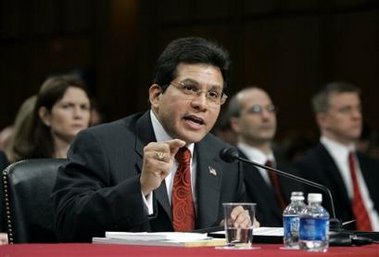WASHINGTON - Senators raised doubts about the legal rationale for the Bush administration's eavesdropping program Monday, forcing Attorney General Alberto Gonzales to provide a lengthy defense of the operations he called a vital "early warning system" for terrorists.
A handful of Republicans joined Democrats in raising questions about whether
President Bush went too far in ordering the National Security Agency's monitoring operations. The senators were particularly troubled by the administration's argument that a September 2001 congressional resolution approving use of military force covered the surveillance of some domestic communications.Senate Judiciary Committee ranking Democrat Patrick Leahy of Vermont, right, calls on Chairman Arlen Specter, R-Pa., left, to have Attorney General Alberto Gonzales sworn in before testifying about whether President Bush was within the law to permit domestic surveillance by the National Security Agency, on Capitol Hill in Washington, Monday, Feb. 6, 2006. Specter ruled against the committee's Democrats who all argued to have Gonzales, the highest ranking law enforcement official in the nation, testify under oath. Gonzales insisted that President Bush is fully empowered to eavesdrop on Americans without warrants as part of the war on terror and he cautioned Congress not to end or tinker with the program. (AP Photo/J. Scott Applewhite)
"The president does not have a blank check," said Judiciary Chairman Arlen Specter, R-Pa., who wants the administration to ask the secretive Foreign Intelligence Surveillance Court to review the program.
"You think you're right, but there are a lot of people who think you're wrong," Specter told Gonzales. "What do you have to lose if you're right?"
Gonzales didn't respond to Specter's proposal directly. "We are continually looking at ways that we can work with the FISA court in being more efficient and more effective," said the former Texas judge.Attorney General Alberto Gonzales answers questions by the Senate Judiciary Committee on whether President Bush, and others in the executive branch, acted illegally in permitting domestic surveillance by the National Security Agency, on Capitol Hill in Washington, Monday, Feb. 6, 2006. He insisted that President Bush is fully empowered to eavesdrop on Americans without warrants as part of the war on terror and he cautioned Congress not to end or tinker with the program. (AP Photo/J. Scott Applewhite)
Under Bush's orders, the ultra-secret National Security Agency has been eavesdropping--without warrants--on international communications of people in the United States whose calls and e-mails may be linked to Muslim extremists.
During the daylong committee hearing, Gonzales and the senators reached as far back as eavesdropping ordered by President Washington and delved into court decisions surrounding presidential powers and the 1978 Foreign Intelligence Surveillance Act.
Gonzales repeatedly defended the current program as lawful, reasonable and essential to national security. He said the president's authority was strongest in a time of war, and he called the monitoring operations an "early warning system designed for the 21st century." He said no changes in law were needed to accommodate the monitoring.
"To end the program now would be to afford our enemy dangerous and potential deadly new room for operation within our own borders," he said.
Much of the questioning here by the Senate Judiciary Committee and Gonzales, doesn't surprise me at all. The senators are trying to press Gonzales to justify why the Bush White House illegally spied on Americans, while Gonzales is regurgitating the same old White House talking points that the Bush administration has the right to illegally spy on Americans, and that the program is needed to fight the war on terror. But now here's this little piece of information:
Democrats repeatedly questioned the truthfulness of Gonzales and Bush, citing statements they'd made about wiretapping before the program became public. In one dustup, Democrats sought--and failed--to have Gonzales sworn in.
The Democrats pressed for Specter to have Gonzales sworn in under oath, and Specter refused. This basically means that Gonzales can lie his butt off in Congress, without any political damage. But there's something else here. Specter refused to have Gonzales sworn in under oath. When you take this bit of information, and tie it in with the previous story about Karl Rove's blacklisting of Republican senators on the Judiciary Committee, you have to ask--did Karl Rove threaten Arlen Specter with blackmail?
Now consider this little piece of information from the story:
Democrats pressed Gonzales for details about the program and other similar operations, almost all of which he would not provide. They've asked Specter to file subpoenas for classified legal opinions on the subject.
It certainly is obvious that the Democrats want classified opinions on the subject--as it is obvious that the Bush administration doesn't want any documentation released on the domestic spying program. My question is, how is Specter going to respond to this Democratic request? Is he going to subpoena these documents, or any other documents from the White House? Or will Specter back down, claiming the Judiciary Committee has all the information it needs to investigate the Bush administration's spying program?
Did Karl Rove blackmail Arlen Specter?




No comments:
Post a Comment